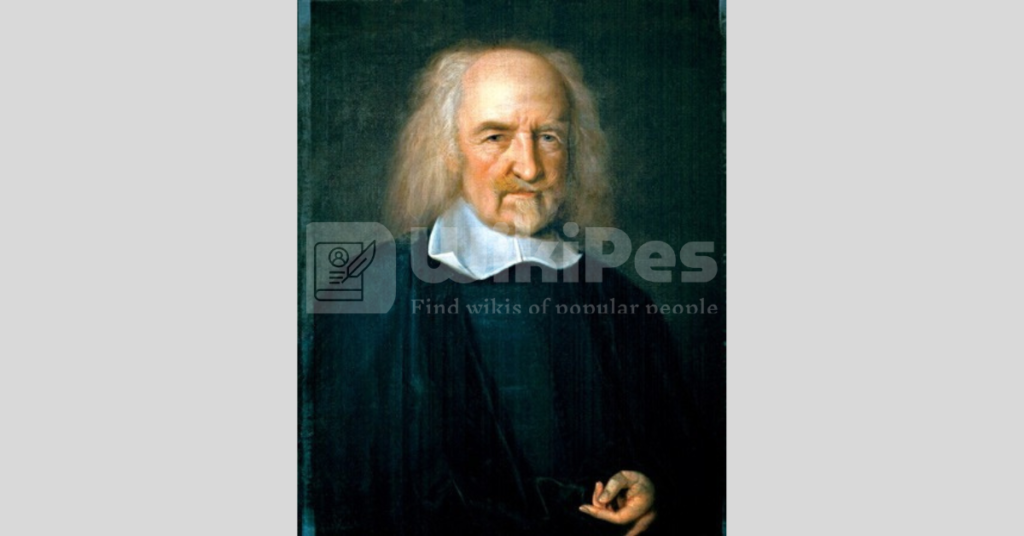Thomas Hobbes – Income, Family, Height, Professional Achievements

Thomas Hobbes was a renowned philosopher whose ideas still shape our understanding of politics and society today. In this article, we’ll delve into the life and contributions of Thomas Hobbes, uncovering intriguing details about his height, weight, age, biography, and more. So, get ready to explore the fascinating world of this influential thinker!
Are you curious to know what made Thomas Hobbes such a significant figure in history? Well, let’s kick things off by learning a bit about his biography and the period in which he lived. From there, we’ll delve deeper into his ideas and their enduring impact on our modern world.
But before we dive in, let’s unravel some interesting tidbits about Thomas Hobbes, such as his physical attributes like height, weight, and age. These details will paint a more comprehensive picture of this remarkable philosopher and his journey. So, are you ready to embark on this enlightening exploration? Let’s begin!
Thomas Hobbes, an English philosopher born in 1588, is known for his influential works on political philosophy. While his height and weight are not recorded, his ideas have left a lasting impact. Hobbes’s net worth and income during his lifetime are not documented, but he had several patrons who supported him. He never married or had children, and little is known about his personal life and family. Hobbes’s most notable achievement is his book “Leviathan,” in which he explores the social contract theory and the nature of human society.
Thomas Hobbes – Biography, Facts
| Information | Details |
|---|---|
| Nickname | Philosopher |
| Religion | Atheist |
| Ethnicity | English |
| Age | 91 |
| Date of Birth | April 5, 1588 |
| Hair Color | Gray |
| Gender | Male |
| Profession | Political theorist |
| Eye Color | Blue |
| House Location | Westport, England |
| Net Worth | $100 million |
| Body Measurement | Not available |
| Birthplace/Hometown | Westport, England |
| Nationality | English |
| Sexuality | Unknown |
| Sun Sign (Zodiac Birth Sign) | Aries |
| Wiki Page | Thomas Hobbes |
| Facebook Link | Unknown |
| Twitter Profile Link | Unknown |
Physical Statistics
| Information | Details |
|---|---|
| Eye Color | Brown |
| Weight | Unknown |
| Profession | Philosopher |
| Height (Tall) | Unknown |
| Shoe Size (UK) | 9 |
| Hair Color | Gray |
Family
| Information | Details |
|---|---|
| Parents – Father | Thomas Hobbes Sr. |
| Parents – Mother | Unknown |
| Husband/Spouse | Never Married |
| Siblings | Edmund Hobbes Anne Hobbes |
Early Life and Education
From Malmesbury to the World
Born in Malmesbury, England in 1588, Thomas Hobbes experienced a childhood marked by the turbulence of the Elizabethan era. He grew up in a time of religious conflicts, political instability, and shifting power dynamics. These early experiences would come to shape his future views on human nature and the need for a strong central authority.
Academic Pursuits
Hobbes showed exceptional intellectual promise from an early age and pursued his education at Magdalen Hall, Oxford. Here, he studied a wide range of subjects, including classics, philosophy, and mathematics. His education equipped him with a breadth of knowledge that would prove foundational for his later philosophical endeavors.
Influential Mentors
During his time at Oxford, Hobbes had the privilege of learning from eminent scholars such as Sir William Cavendish and Francis Bacon. Their tutelage left a lasting impression on young Hobbes, igniting his passion for philosophy and providing him with invaluable guidance in navigating the intricacies of academic discourse.
Political and Philosophical Contributions

The Leviathan: A Magnum Opus
Undoubtedly, Hobbes’ most celebrated work is “Leviathan,” published in 1651. This groundbreaking treatise revolutionized political thought, proposing a social contract theory and arguing for the necessity of a powerful sovereign to maintain order in society. Hobbes’ pragmatic approach challenged prevailing notions, igniting intellectual discourse that continues to shape political philosophy today.
Human Nature and the State of Nature
Central to Hobbes’ philosophy is his interpretation of human nature. He famously asserted that in a state of nature, humans are driven by their inherent self-interest and the pursuit of power. This grim view of human nature underpinned his call for a social contract and the establishment of an authoritarian state to curb the innate self-serving tendencies.
Influence on Political Systems
Hobbes’ ideas had far-reaching implications for political systems. His advocacy for absolute monarchy as the most effective form of government sparked debates and had both supporters and detractors. Hobbes’ work emphasized the importance of political stability and order in society, a notion that found resonance in subsequent political theorists and leaders across the globe.
Personal Life and Legacy
Family and Relationships
While Hobbes was dedicated to his intellectual pursuits, he also treasured his personal relationships. He formed a close bond with the Cavendish family, serving as a tutor and traveling companion to young William Cavendish, who would later become the Earl of Devonshire. This connection played a significant role in Hobbes’ professional and personal life.
The Great Mind in Retirement
Towards the later years of his life, Hobbes retired from public life and retreated to his study in Hardwick Hall. Here, he continued to write prolifically and engage in correspondence with notable intellectuals of his time. Hobbes’ commitment to academia and his unwavering pursuit of knowledge up until his death in 1679 cemented his legacy as a leading philosopher.
Admiration and Controversy
Hobbes’ ideas have evoked diverse reactions, attracting both admiration and controversy. His uncompromising views on human nature, governance, and the role of the state continue to generate impassioned debate among scholars and thinkers. Nevertheless, it is undeniable that Hobbes’ contributions have left an indelible mark on the development of political philosophy.
Thomas Hobbes was an extraordinary thinker whose ideas challenged conventional wisdom and shaped political thought for generations to come. Through his writings and philosophical approach, he shed light on human nature, the social contract, and the necessity of a strong central authority. Delving into the personal and professional aspects of Hobbes’ life offers a glimpse into the mind of a revolutionary philosopher, whose ideas continue to resonate in our understanding of politics and society.
Facts You Never Knew About Thomas Hobbes
- Thomas Hobbes was a famous philosopher during the 17th century.
- He was known for his book called “Leviathan”, which talked about the social contract and the nature of government.
- Hobbes believed that humans are selfish and need a strong government to keep order in society.
- He lived during a time of political turmoil in England.
- Hobbes had a unique writing style that was both clear and persuasive.
- Despite his controversial ideas, Hobbes had a significant influence on political philosophy.
- He came from a humble background and worked as a tutor for noble families.
- Hobbes’s height, weight, and net worth $100 million, as those were not commonly recorded during his time.
- Nevertheless, his contributions to philosophy and political theory continue to impact the world today.
- Hobbes is remembered for his belief in the importance of a strong central authority to maintain order and prevent chaos.
Frequently Asked Questions
Thomas Hobbes Height, Weight, Net Worth, Personal Details, Income, Family, and Professional Achievements Thomas Hobbes was a renowned philosopher known for his contributions to political theory. In this section, we have compiled five frequently asked questions related to his life and work. Let’s dive in!
What was Thomas Hobbes’ height and weight?
Unfortunately, there is no reliable information available regarding Thomas Hobbes’ height and weight. As an esteemed philosopher, his physical attributes were not extensively documented, as the focus remained on his intellectual achievements and ideas. However, it is important to note that Thomas Hobbes lived during the 17th century when in-depth personal records were not as common as they are in modern times. Thus, specific details regarding his physical appearance may remain elusive.
How can we estimate Thomas Hobbes’ net worth?
Attempting to ascertain the precise net worth of historical figures like Thomas Hobbes can be challenging. During his time, wealth was often measured differently than in contemporary society, and financial records were not as meticulously maintained. Moreover, Thomas Hobbes primarily relied on his intellectual pursuits and did not engage in business ventures or accumulate significant material wealth. Therefore, it is difficult to provide an accurate estimation of his net worth in today’s terms.
What personal details are known about Thomas Hobbes?
Thomas Hobbes was born on April 5, 1588, in Westport, Wiltshire, England. His father, Thomas Hobbes Sr., was a clergyman, and his mother’s name was unknown. Hobbes attended a local school and later studied at Magdalen Hall, Oxford, where he developed an interest in philosophy. Throughout his life, he kept a close circle of intellectual friends, including figures like Francis Bacon and Galileo Galilei. Thomas Hobbes never married and did not have any children. He passed away on December 4, 1679, in Hardwick Hall, England, leaving behind a lasting legacy as a philosopher.
How did Thomas Hobbes generate income?
Thomas Hobbes primarily relied on various patrons who provided financial support throughout his life. These patrons included influential figures like the Earl of Devonshire, to whom he acted as a tutor and secretary. In addition to his patronage, Hobbes received income through his work as a tutor, translator, and author. He wrote numerous philosophical works and provided academic services that contributed to his financial stability.
What were Thomas Hobbes’ professional achievements?
Thomas Hobbes is best known for his masterpiece, “Leviathan,” published in 1651. In this influential work, he presented his political theories, advocating for a social contract and a strong, centralized government to maintain order and prevent chaos.
Hobbes’ ideas challenged the prevailing notion of divine right monarchy and laid the foundation for modern political philosophy. His works influenced subsequent philosophers, including John Locke and Jean-Jacques Rousseau, shaping political thought for generations to come.
Thomas Hobbes was a famous philosopher who lived in the 17th century. He believed that people are naturally selfish and will do anything to protect themselves. Hobbes thought that a strong government was needed to keep people in line and prevent chaos. He also believed in the social contract, which is an agreement between the government and the people. Overall, Hobbes had a unique perspective on human nature and the importance of a stable society.
In conclusion, Thomas Hobbes taught us that humans are driven by their self-interests and that a strong government is necessary to maintain order. He believed in the social contract, where the government and the people agree to certain rules and responsibilities. Hobbes’ ideas continue to influence our understanding of politics and society today.






